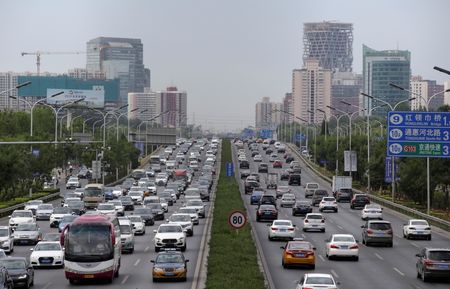 1
1 1
1

SHANGHAI/BERLIN (Reuters) -Car sales in China, Europe and the United States remain depressed compared to last year’s levels as semiconductor shortages and anti-pandemic measures weigh on global autos markets, data showed on Thursday.
Chinese retail car sales grew in May from April but were still down 16% year-on-year, according to the Chinese Passenger Car Association, which called for more government support for the industry.
In Europe, data from auto consultancy JATO showed new car sales down 20%, with electric vehicles (EVs), which many automakers have prioritised amid supply chain troubles, also down by 1.4%.
The fall was driven by a 15% drop in sales of plug-in hybrid EVs, whose environmental credentials are coming under growing scrutiny from European regulators.
In the U.S., total sales were down 21% year-on-year, according to research by Deutsche Bank, with last year’s sales bumped up by a post-lockdown release of pent-up demand.
“We expect sales to recover sequentially further through the year,” the report said.
Overall, car sales in China in the first quarter were 0.2% higher than last year, data showed. By contrast, Europe’s year-to-date sales were down 13% by JATO’s figures, at their second lowest level since 1991.
Still, further economic data from China paints a picture of a grinding and only partial economic recovery from anti-pandemic measures.
Road freight transportation and express delivery from distribution centres last week were both stronger than a month earlier but still down sharply on last year, Nomura Global Economics said.
Chinese electric vehicle maker Xpeng is accelerating deliveries after resuming double-shift production in mid-May at its plant in the southern city Zhaoqing, the chairman of the company, He Xiaopeng, told analysts this week.
Tesla added a second shift at its Shanghai plant on Thursday, heading towards making 2,600 cars daily, a person familiar with the matter said.
Tesla did not respond to a request for comment.
(Reporting by Zhang Yan and Brenda Goh; Victoria Waldersee in Berlin; Editing by Bradley Perrett, David Evans and Bernadette Baum)